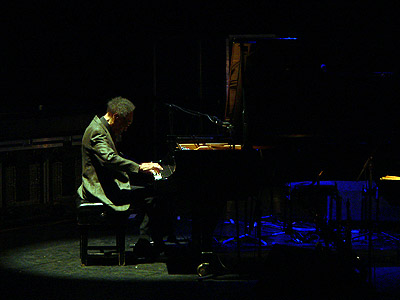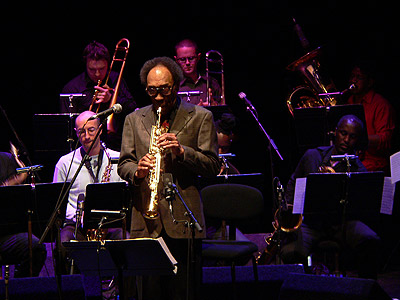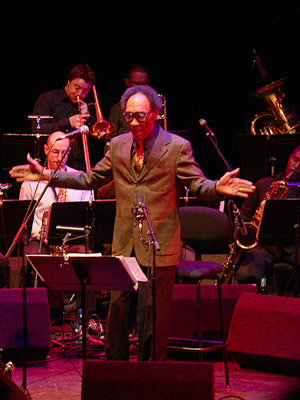
Sam Rivers
12th November 2004, Queen Elizabeth Hall, London Jazz Festival
Sam Rivers first performed in the 40s, played with
a rollcall of greats including Billie Holiday, Miles Davis, Cecil Taylor,
Andrew Hill and Dave Holland. He ran a performance space in the ‘70s
in NYC called Studio Rivbea, has been at the core of the avant-garde for
three decades and has now reached the grand old age of 81. As a result this
concert, the last of a short UK tour, feels more like an event than a mere
performance. The Queen Elizabeth Hall is packed and in the moments before
the lights dim the weathered faces and careful steps of the old guard are
notable alongside more than a smattering of the slender and youthful. The
evening comprises two halves with Rivers’ trio appearing first and
followed by a specially assembled big band, Rivbea Orchestra UK.
Mr Rivers takes the stage, dapper in dark plaid jacket, black shirt and colourful tie, signature shocked hair a dark halo above his up and over brow. With a brief nod to the audience he picks up a soprano saxophone and effortlessly conjures a tumbling stream of rapid, unpredictable notes. Doug Matthews and Anthony Cole race along with him in quicksilver dialogue, on double bass and drums respectively. After five or six minutes the piece comes to a natural end and Rivers smilingly tells the audience “Impromptu for you. Never to be heard again. I don’t know what I did.” The subtle note of wonder in his voice speaks volumes for a continuing and impressive enthusiasm which he continues to display throughout the evening.
Rivers later comments that the trio are used to having at least a couple of hours to perform rather than the briefer first set of this tour. Rather than concentrate upon a particular facet of the trio’s music, the audience is treated to solo spots for each musician alongside successive reconfigurings like Ripples which sees Matthews playing bass clarinet and Cole tenor saxophone. While his accompanists take darting, supportive roles, Rivers’ lines wriggle and tumble, are momentarily drawn out and rush forward again, all to delightful effect. Next Rivers seats himself at the piano and begins to improvise alone around a wry, but attractively warm-hearted melody. After a couple of minutes the music takes an unexpectedly angular left turn, returns to the piece’s original path briefly, then departs once more and finally for free territory joined by Matthews and Cole. ‘Beatrice’, dedicated to his wife of 52 years, is played fragile and strong, tender and playful. It’s a charming testament to their love. ‘Nightfall’ begins with screams and smeared cries which evaporate into wistful interludes. ‘Iris’ and its successors see Rivers on flute overblowing and singing through his instrument. As he plays he dances with just a little shake, a little wriggle and the effect of music and movement is decidedly funky.
After the interval, the trio is augmented with thirteen of the UK’s younger generation of players including Tony Kofi, Iain Ballamy, Martin Speake, Byron Wallen and Chris Batchelor to form The Rivbea Orchestra UK. Rivers prefaces the performance of selected pieces of his Pulsar Suite with the comment that “I’ve written two books, now I have to try to cut down to one page.” In fact the music sounds as though it’s been physically compressed into a smaller space of time rather than being edited down. Large blocks of sound rain down upon the audience like fast-moving tectonic plates. Rivers hands solos out with small hand gestures. They race out of the tiny spaces between sections and are over almost before they’ve begun (it’s necessary to scan the orchestra’s ranks to spy the latest soloist before they rejoin the ensemble). Only occasionally do soloists bob up and over the musical tidalwave that engulfs them. The music, powered by a big low end comprising tuba, electric bass and baritone sax is punchy, vigorous, athletic even. Throughout the concert and more so in this second half Rivers punctuates and concludes pieces with a hoopoe-like cry that is an expression both of pleasure and surprise. At times the power of this ensemble reaches tumultuous proportions: its parts are clearly defined, but straining at their boundaries.
As Rivers departs the stage all too soon, the one regret of the second half is that his playing has been too little heard. He performs a single encore, ‘Willow’ which he introduces with the observation that there are too many of these trees in the American South. Rivers inaugurates this final piece alone on flute with the ensemble gradually stealing up behind him before bursting into full force. Rather than the sustained, titanic attack of previous pieces, however, ‘Willow’ proves to be altogether looser-limbed, its orchestrated surges retreating and returning wave-like over the piece’s duration. Steeped in soul, funk and blues, Sam Rivers is at the music’s centre singing this song of endless departure and homecoming. Before this evening an unspoken question hangs in the air, namely whether these shores will see another visit from the man. On the strength of tonight’s performance it doesn’t seem unreasonable to predict that he’ll return again and again. Here’s hoping.
Mr Rivers takes the stage, dapper in dark plaid jacket, black shirt and colourful tie, signature shocked hair a dark halo above his up and over brow. With a brief nod to the audience he picks up a soprano saxophone and effortlessly conjures a tumbling stream of rapid, unpredictable notes. Doug Matthews and Anthony Cole race along with him in quicksilver dialogue, on double bass and drums respectively. After five or six minutes the piece comes to a natural end and Rivers smilingly tells the audience “Impromptu for you. Never to be heard again. I don’t know what I did.” The subtle note of wonder in his voice speaks volumes for a continuing and impressive enthusiasm which he continues to display throughout the evening.
Rivers later comments that the trio are used to having at least a couple of hours to perform rather than the briefer first set of this tour. Rather than concentrate upon a particular facet of the trio’s music, the audience is treated to solo spots for each musician alongside successive reconfigurings like Ripples which sees Matthews playing bass clarinet and Cole tenor saxophone. While his accompanists take darting, supportive roles, Rivers’ lines wriggle and tumble, are momentarily drawn out and rush forward again, all to delightful effect. Next Rivers seats himself at the piano and begins to improvise alone around a wry, but attractively warm-hearted melody. After a couple of minutes the music takes an unexpectedly angular left turn, returns to the piece’s original path briefly, then departs once more and finally for free territory joined by Matthews and Cole. ‘Beatrice’, dedicated to his wife of 52 years, is played fragile and strong, tender and playful. It’s a charming testament to their love. ‘Nightfall’ begins with screams and smeared cries which evaporate into wistful interludes. ‘Iris’ and its successors see Rivers on flute overblowing and singing through his instrument. As he plays he dances with just a little shake, a little wriggle and the effect of music and movement is decidedly funky.
After the interval, the trio is augmented with thirteen of the UK’s younger generation of players including Tony Kofi, Iain Ballamy, Martin Speake, Byron Wallen and Chris Batchelor to form The Rivbea Orchestra UK. Rivers prefaces the performance of selected pieces of his Pulsar Suite with the comment that “I’ve written two books, now I have to try to cut down to one page.” In fact the music sounds as though it’s been physically compressed into a smaller space of time rather than being edited down. Large blocks of sound rain down upon the audience like fast-moving tectonic plates. Rivers hands solos out with small hand gestures. They race out of the tiny spaces between sections and are over almost before they’ve begun (it’s necessary to scan the orchestra’s ranks to spy the latest soloist before they rejoin the ensemble). Only occasionally do soloists bob up and over the musical tidalwave that engulfs them. The music, powered by a big low end comprising tuba, electric bass and baritone sax is punchy, vigorous, athletic even. Throughout the concert and more so in this second half Rivers punctuates and concludes pieces with a hoopoe-like cry that is an expression both of pleasure and surprise. At times the power of this ensemble reaches tumultuous proportions: its parts are clearly defined, but straining at their boundaries.
As Rivers departs the stage all too soon, the one regret of the second half is that his playing has been too little heard. He performs a single encore, ‘Willow’ which he introduces with the observation that there are too many of these trees in the American South. Rivers inaugurates this final piece alone on flute with the ensemble gradually stealing up behind him before bursting into full force. Rather than the sustained, titanic attack of previous pieces, however, ‘Willow’ proves to be altogether looser-limbed, its orchestrated surges retreating and returning wave-like over the piece’s duration. Steeped in soul, funk and blues, Sam Rivers is at the music’s centre singing this song of endless departure and homecoming. Before this evening an unspoken question hangs in the air, namely whether these shores will see another visit from the man. On the strength of tonight’s performance it doesn’t seem unreasonable to predict that he’ll return again and again. Here’s hoping.
Colin Buttimer
Published by Me


